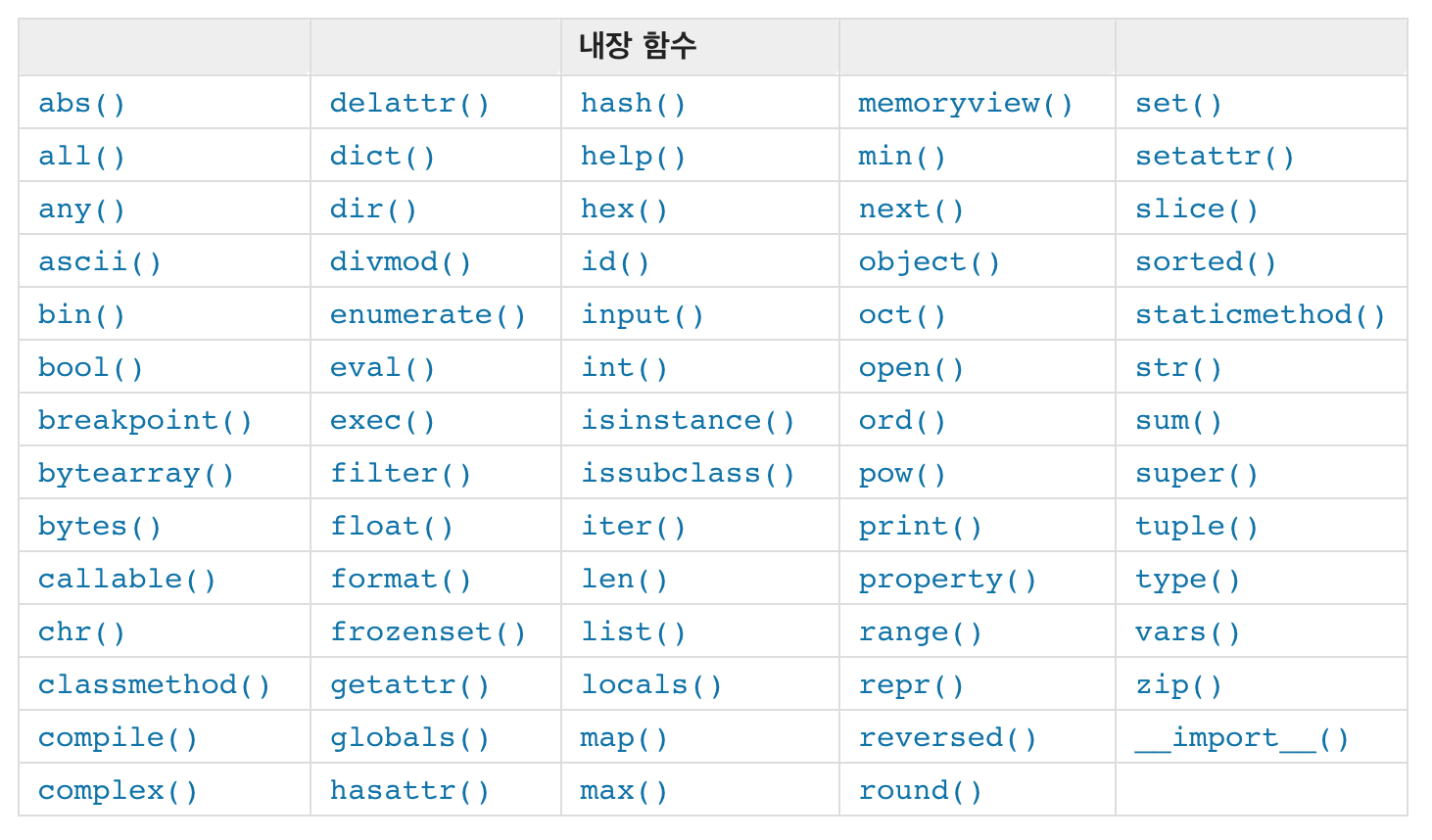Python Camp

Life is short. You need Python.
Module
- 함수, 클래스등을 모아놓은 스크립트 파일.
Why Use Module
- 효율성
- 자주 사용하는 함수….매번 스크립트에 선언하기 귀찮음..
- 스크립트에 딱 한번 적어놓고 쓰자!
%%writefile arithmetic.py
def add(x, y):
"""
x+y
"""
return x + y
def sub(x, y):
"""
x-y
"""
return x - y
def mul(x, y):
"""
x*y
"""
return x*y
def div(x, y):
"""
x/y
"""
return x/y
import 모듈이름
- 모듈을 import 하겠다.
import arithmetic
print(arithmetic.add(5, 2))
print(arithmetic.sub(5, 2))
print(arithmetic.mul(5, 2))
print(arithmetic.div(5, 2))
import 모듈이름 as 별칭
- 모듈이름을 import 하고 별칭 이라고 하겠다.
import arithmetic as am
print(am.add(5, 2))
print(am.sub(5, 2))
print(am.mul(5, 2))
print(am.div(5, 2))
from 모듈이름 import 모듈 함수
- 모듈이름 에서 모듈함수를 import 하겠다.
from 모듈이름 import *
- 모듈이름 에서 모든 모듈함수를 import 하겠다.
from arithmetic import *
print(add(5, 2))
print(sub(5, 2))
print(mul(5, 2))
print(div(5, 2))
from 모듈이름 import 모듈함수 as 별칭
- 모듈이름 에서 모듈함수를 import 하고 별칭 이라고 하겠다.
from arithmetic import add as func_1
from arithmetic import sub as func_2
from arithmetic import mul as func_3
from arithmetic import div as func_4
print(func_1(5, 2))
print(func_2(5, 2))
print(func_3(5, 2))
print(func_4(5, 2))
Package
- 모듈들을 폴더(디렉토리)의 구조로 관리할 수 있도록 해줌.

- 모듈을 패키지로 취급하게 하기 위해선
__init__.py파일이 필요.- python 3.3 이상에선 필요 없으나 호환성을 위해…..
--self_package
-- __init__.py
-- test_math.py
-- module1
-- test_math.py
-- module2
-- test_math.py
test_math.py 내용은 다음 과 같음.
#test_math.py
def add(x, y):
"""
x+y
"""
return x + y
def sub(x, y):
"""
x-y
"""
return x - y
def mul(x, y):
"""
x*y
"""
return x*y
def div(x, y):
"""
x/y
"""
return x/y
# docstring에서 file 경로 확인!
from self_package import test_math as package
print(package.add(1, 2))
print(package.sub(1, 2))
print(package.mul(1, 2))
print(package.div(1, 2))
# docstring에서 file 경로 확인!
from self_package.module1 import test_math as module1
print(module1.add(1, 2))
print(module1.sub(1, 2))
print(module1.mul(1, 2))
print(module1.div(1, 2))
# docstring에서 file 경로 확인!
from self_package.module2 import test_math as module2
print(module2.add(1, 2))
print(module2.sub(1, 2))
print(module2.mul(1, 2))
print(module2.div(1, 2))
from test_dir.sub_test1 import test as sub1
sub1.add()
from test_dir.sub_test2 import test as sub2
Built-in Functions
-
파이썬에는 기본적으로 많은 함수들을 제공.

# abs()
print("Test abs : ", abs(-5))
# sum()
print("Test sum : ", sum([1, 2, 4, 5, 6, 7]))
# max()
print("Test max : ", max(50, 30, 10, 55, 20, 300))
# min()
print("Test min : ", min(50, 30, 10, 55, 20, 300))
# pow()
print("Test pow : ", pow(5, 4))
# round()
print("Test round : ", round(3.2245))
# sorted()
print("Test sorted : ", sorted([5,4,3,2,1]))
# len()
print("Test len : ", len("python"))
외장 함수 (표준 라이브러리)
- 파이썬이 설치될때 같이 설치되는 패키지들.
-
built-in function 과는 다르게 import 를 하여 사용.
- list
- os (운영 체제 인터페이스)
- glob (파일 목록 검색)
- sys (스크립트 명령어)
- re (정규 표현식)
- math (수학)
- urllib (인터넷 액세스)
- datatime (날짜와 시간)
- zlib, gzip, lzma,… (데이터 압축)
- timeit (성능 측정)
- random (난수 발생)
- …
- 표준 라이브러리 둘러보기 -1
- 표준 라이브러리 둘러보기 -2
import random
random.randint(1, 9)
8
import glob
# * 은 와일드카드 라고 하며 여러 파일을 한꺼번에 지정할 때 사용.
glob.glob('./*.py')
['./lambda_yield.py',
'./arithmetic.py',
'./assignment_solution.py',
'./my_math.py']
Error & Exception
-
프로그램을 통한 제어의 흐름을 수정할 수있는 이벤트.
- SyntaxError
- 문법 에러, 파싱 에러라고 하며 이름 그대로 문법에 오류가 있을 때 발생하는 에러.
- 에러가 발생한 위치를 ^ 를 이용하여 표시해줌.
- Exception
- 문법, 표현식에는 문제가 없지만 다른 이유로 발생하는 에러.
- 예외가 발생한 Line을 표시.
- try/except/else/finally

- raise
- assert
Built-in exception
print("sdw"
if i:
print("Hello")
print(test)
print(2/0)
print("4"+5)
print(5+"3")
- 이 외에도 매~~~~우 많은 Built-in exception 이 존재.
Built-in exception list
try/except/else/finally
# try/except
try:
print("try clause")
x = int(input("Please input a number : "))
except :
print("except clause")
print("Oops! That was no valid number. Try again...")
#try/except/except
try:
print("Try clause")
x = int(input("Please input a number : "))
print(y)
except ValueError:
print("1st except clause")
print("ValueError !")
except NameError:
print("2nd except clause")
print("NameError !")
try:
print("Try clause")
x = int(input("Please input a number : "))
print(y)
except ValueError as e:
print("1st except clause")
print("ValueError !")
print(e)
except NameError as e:
print("2nd except clause")
print("NameError")
print(e)
try:
print("\n---------------------")
print("Try clause")
x = int(input("Please input a number : "))
except ValueError as e:
print("\n---------------------")
print("except clause")
print(e)
else:
print("\n---------------------")
print("nelse clause")
print("x is ", x)
finally:
print("\n---------------------")
print("finally clause")
print("End Exception")
try:
raise Exception("Exception!", "What!?")
except Exception as e:
print(e)
print(type(e))
print(e.args)
자신 만의 Exception & raise
class SelfError(Exception) :
pass
while True:
try:
print("\n---------------------")
print("Try clause")
x = int(input("Please input a number : "))
if x<10:
raise SelfError("args1", "args2")
break
except ValueError as e:
print("\n---------------------")
print("1st except clause")
print(e)
except SelfError as e:
print("\n---------------------")
print("2nd except clause")
print(e)
raise
while True:
try:
print("\n---------------------")
print("Try clause")
x = int(input("Please input a number : "))
if x<10:
raise SelfError()
break
except ValueError as e:
print("\n---------------------")
print("1st except clause")
print(e)
except SelfError as e:
print("\n---------------------")
print("2nd except clause")
print(e)
raise
try:
print("\n---------------------")
print("Try clause")
x = int(input("Please input a number : "))
if x <10:
raise ValueError("Lower than 10!!")
except ValueError as e:
print("\n---------------------")
print("except clause")
raise
else:
print("\n---------------------")
print("else clause")
print("x is ", x)
finally:
print("\n---------------------")
print("finally clause")
print("End Exception")
while True:
try:
print("\n---------------------")
print("Try clause")
x = int(input("Please input a number : "))
if x <10:
raise ValueError("Lower than 10!!")
except ValueError as e:
print("\n---------------------")
print("except clause")
print(e)
#raise
else:
print("\n---------------------")
print("else clause")
print("Now is else time.")
break
finally:
print("\n---------------------")
print("finally clause")
print("End Exception")
assert
test_assertion = [1, 2, 3, 4]
assert len(test_assertion) == 3, "Assertion Error!"
def confirm_int(x):
assert type(x) == int, "x is not int !"
return x
confirm_int(0.2)